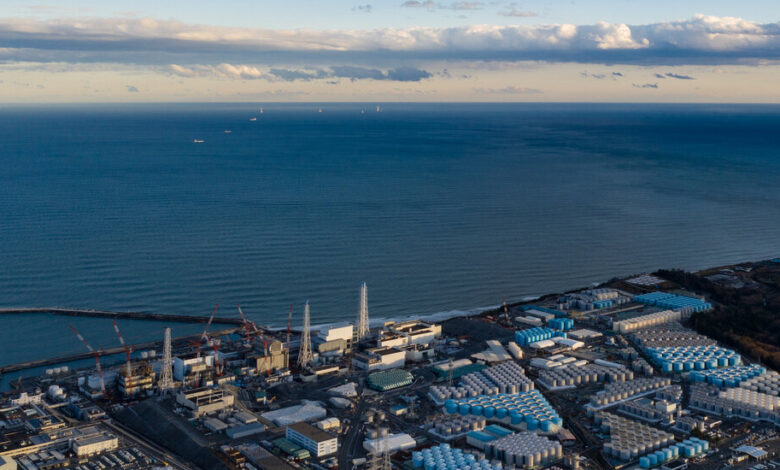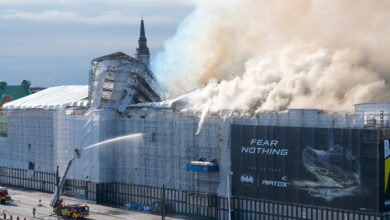Scientists Say Fukushima Water Is Secure, however Radiation Fears Persist

[ad_1]
In one of many remaining steps earlier than Japan decides to launch multiple million metric tons of handled radioactive water from the Fukushima nuclear plant into the Pacific Ocean, the Worldwide Atomic Power Company declared on Tuesday that the federal government’s plan had met the company’s security requirements.
The nuclear authority’s closing report concluded that the handled water would “have a negligible radiological affect to individuals and the surroundings” as soon as it’s launched.
Japan’s plan has provoked controversy each at house and overseas, as authorities officers in China and lots of residents in South Korea have protested the discharge as unsafe.
Rafael Grossi, the Worldwide Atomic Power Company’s director basic, mentioned that, ought to Japan proceed with its deliberate discharge, the IAEA would additionally open a station in Fukushima to proceed reviewing the water’s security “for many years to return.”
Japan introduced its proposal to launch the water from the Fukushima plant in 2019 and accepted the plan two years later. Since then, an IAEA job pressure has performed a number of evaluations of the nation’s progress in treating the water.
For years, Tepco, the facility firm that operated the plant and that’s now overseeing its decommissioning, mentioned that remedy of the water — which includes sending it by way of a strong filtration system to take away most radioactive materials — was making it protected to launch.
Critics say that the Japanese authorities and Tepco haven’t been clear sufficient in regards to the remedy course of or the deliberate launch.
Wu Jianghao, China’s ambassador to Japan, mentioned in a information convention on Tuesday that “Japan ought to cease the plan to launch the water into the ocean, however critically seek the advice of with the worldwide neighborhood and think about a scientific, protected, clear and convincing response.” He added that Japan had made its choice with out “enough consultations.”
Even inside Japan, opinion is split. In a ballot launched over the weekend by JNN, a Japanese tv community, 45 % of respondents supported the plan, whereas 40 % mentioned they had been in opposition to it.
“So many good scientists really feel that the information introduced up to now has been incomplete,” mentioned Azby Brown, lead researcher with Safecast, an impartial radiation-monitoring group.
Mr. Brown mentioned that the well being threat posed by the launched water will “be very low and a magnitude of 1000’s of instances decrease than on a regular basis publicity” to radiation. “However your complete course of has not been clear sufficient,” he mentioned. “It has not been inclusive, and so they haven’t been thorough.”
Tokyo has supplied repeated assurances that the water is protected sufficient to be launched into the ocean, saying that filtration has eliminated most isotopes, although it does include traces of tritium, an isotope that’s onerous to separate from water, in addition to small traces of carbon-14 and iodine-129, based on Mr. Brown.
At a gathering with Mr. Grossi, Prime Minister Fumio Kishida of Japan mentioned the nation “wouldn’t approve a launch that would have a damaging affect on individuals in Japan and the world and the surroundings.” He added that the federal government would “proceed to completely clarify in and out of doors of Japan” its rationale for releasing the handled water into the ocean, “based mostly on scientific grounds with excessive transparency.”
Hirokazu Matsuno, chief cupboard secretary to Mr. Kishida, mentioned on Tuesday that the discharge was nonetheless on track for this summer season after the federal government had reviewed security measures and thought of “damages ensuing from rumors” in different international locations.
How to answer the discharge of Fukushima water has turn into a deeply polarizing challenge in South Korea, threatening the delicate rapprochement between Seoul and Tokyo that started earlier this yr.
Latest surveys confirmed that 80 to 85 % of South Koreans opposed Japan’s plan to dump the Fukushima water into the Pacific and nervous in regards to the affect it will have on seafood and the marine surroundings.
Mr. Grossi will go to Seoul on Friday to debate the rising nervousness in South Korea, the place salt costs have surged in current weeks after individuals began hoarding sea salt harvested from salt ponds on the nation’s west coast forward of the discharge.
Park Gwangon, a frontrunner of South Korea’s opposition Democratic Get together, cited fears amongst South Koreans that the IAEA’s security evaluate can be “political, fairly than scientific” and “tailor-made for Japan.”
The South Korean authorities has tried to dispel fears amongst its residents by vowing to ramp up efforts to watch seawater, fisheries and pure salt farms for any rise in radioactive substances.
Authorities officers reassured the general public on Monday that South Korea’s ban on seafood from the waters close to Fukushima — first imposed following the 2011 catastrophe — would stay in place even after Japan started discharging the handled water.
Mr. Grossi mentioned that the water launch technique being deployed in Japan has a “confirmed observe report” in lots of different international locations, together with China, South Korea and america. Beneath the present plan, the water can be launched in a managed, gradual method over the course of a number of many years.
The water Japan plans to discharge into the Pacific was primarily used to chill broken reactors on the Fukushima energy plant, which was destroyed in 2011 by an earthquake and tsunami. Japan says it must launch the water that’s at present saved earlier than the plant runs out of space for storing.
Hisako Ueno contributed to this report.
[ad_2]
Source link



